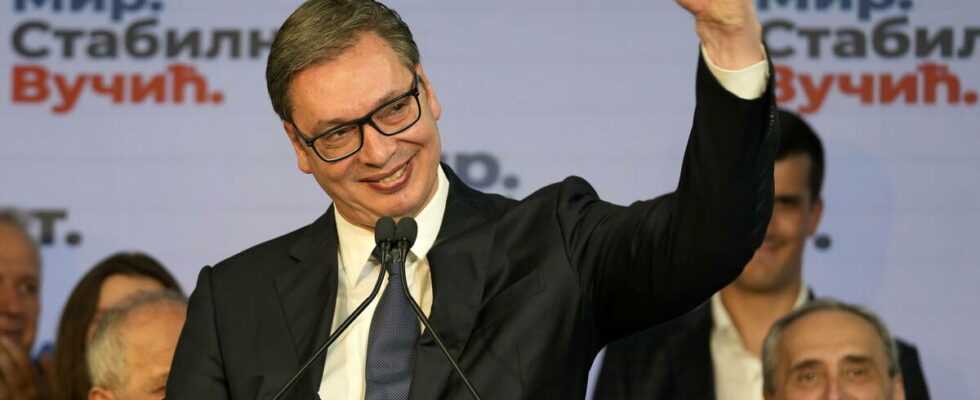“I went to vote for the opposition, I try to believe in change, but there are so many frauds that it is difficult to have hope”, says Ori, a 40-year-old Belgrader, who is strolling with a friend in Republic Square on Sunday evening. The preliminary results of the night prove him right. As expected, the outgoing president, Aleksandar Vucic, should stand for a second term by winning nearly 60% of the vote in the first round. His party, the SNS, won about 43% of the votes in the legislative elections and should easily form a majority. Far behind, the main opposition coalition, the centrists of United Serbia, obtained around 13% of the vote.
These are still only unofficial results because the electoral commission (RIK) decided on Sunday evening not to continue the press conferences, nor to announce the turnout at the closing of the polls, at 8 p.m. An unusual decision that raised questions from the opposition. Several elected officials had already cringed following the declarations of the president of the electoral commission, who was proud that this Sunday was a day of celebration for democracy in Serbia. Election day was marked by violence against several political leaders. The video of the attack on Pavle Grbovic, an opposition figure, was widely circulated at the start of the day. He would have been targeted by people whose attempts at electoral fraud he denounced.
Recruit voters
Srdjan Cvijic, analyst of the think tank Biepag, was electoral controller in the municipality of Zemun, in Belgrade, on behalf of the ecological coalition Moramo (“we must”). He explains that he witnessed the same type of manipulation. “Controllers from my polling station, paid by the [parti au pouvoir] SNS, did not stay inside, but came out to try to recruit voters. I saw them when I went out to do a few rounds. Except that in Serbia, it is not forbidden, if you are more than 50 meters from the polling station”, he says. Srdjan Cvijic, however, specifies that blackmail or pressure are not allowed, but that it is almost impossible to prove the content of the discussions. “I did not film them, like Pavle Grbovic, so there was no physical violence, only verbal violence when I pointed out to them that their practices were illegitimate”, he continues.
In Zrenjanin, a town of 75,000 inhabitants in the north of the country, Natasa Velemir, candidate for the centrist opposition list United Serbia in the legislative elections, witnessed vote buying. “I saw my former high school teacher go to vote at the same polling station as me, then cross the street, show some SNS guys that she had voted for them and leave with a packed lunch. She sold her choice for the next five years for 7 euros,” she gasps.
A large number of videos and similar accounts of manipulation flirting with legality or sometimes totally irregular are circulating on the Internet. The observation NGO CRTA draws up a severe assessment of the triple presidential, legislative and municipal elections. On Monday, she lamented “an extremely poorly organized and tense day, the result of the continued breakdown in the integrity of the electoral process as a whole, marked by the reinforcement of various forms of electoral corruption and endangering the right to vote of citizens”.
rock the city
The opposition’s low scores are below expectations, apart from the Belgrade town hall where United Serbia and Moramo may be hoping to rock the city. “Perhaps we should not have taken part in the ballot”, loose Natasa Velemir. The opposition had boycotted the previous legislative elections in 2020, due to unfair electoral conditions. Serbia, a candidate for the European Union, was then lectured by Brussels for its monolithic Parliament. President Aleksandar Vucic’s party had therefore accepted some concessions so that the opposition would agree to return to the democratic game.
But the fraud that we see on election day is only a small part of the problem. “The SNS has woven a patronage network, coupled with pressure on voters all over the country”, explains Marta Szpala, research director in charge of the Balkans of the think tank OSW. The pressures are strong, particularly within the public sector, the main provider of employment in Serbia. The campaign is also very unbalanced in the media.
“The opposition has almost no access to television channels, so it is very difficult to present a program, promote new leaders”, explains the researcher. She believes that it is in this area that the European Union should demand change in the first place. Marta Szpala recalls: “Brussels let Aleksandar Vucic do a lot of things that went against the rule of law, which undermines EU policy in the Western Balkans.”
